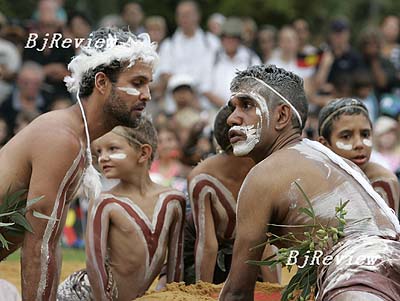|

Australian Prime Minister John Howard recently promised to hold a referendum on indigenous reconciliation within 18 months of his return to office, if he is reelected in the federal election later this month. In a speech to the Sydney Institute on October 11, he said his goal is to have a "statement of reconciliation" incorporated into the preamble of the Australian constitution to formally recognize indigenous people as the first inhabitants of Australia.
His remarks have created a big sensation across the country. Australians have been taken aback by Howard's U-turn on indigenous policy. Their surprise is well founded, given the prime minister's past actions on this issue during his 11 years in office.
A troubled history
First, Howard has a record of breaking his promises on this issue. Campaigning for a reelection in 1998, he pledged to hold a reconciliation referendum in 2001. However, he shelved the plan after he was reelected, calling for "practical reconciliation" instead of "symbolic reconciliation."
Second, Howard refuses to apologize to indigenous Australians. Before 1938, the Australian Government practiced a "protection" policy toward indigenous people. The government conducted "assimilation" from the 1930s to the early 1960s, when many indigenous children were forcefully taken away from their parents and adopted by white families. These children, who completely lost touch with their original families, became a "lost generation."
Even with the "integration" and "indigenous self-determination" processes since the 1960s, there have been scandals such as the deaths of indigenous people held in custody. In 1997, after reviewing the injustices that indigenous Australians had suffered, the Human Rights and Equal Opportunities Commission suggested the government make a national apology to them. However, Howard has always refused to apologize. He said a collective national apology would not provide the necessary basis to move forward, but reinforce a "culture of victimhood" and take Australia backwards.
Third, Howard's relations with the indigenous people have been strained. Howard drastically amended the government's indigenous policy after he assumed office in 1996. Flaunting the banner of "equal opportunity" and "shared responsibilities," he reformed the social welfare system by scrapping "passive welfare" and linking welfare to indigenous people's performance. He put forward the Ten-Point Plan, restricting the indigenous people's right to negotiate on the land issue. He also abolished the Aboriginal and Torres Islanders Commission and created the National Indigenous Council, which he staffed with handpicked members. As a result, indigenous people were deprived of their channel for holding a direct dialogue with the government.
In his speech to the Sydney Institute, Howard admitted that there had been low points when the dialogue between him and indigenous leaders dwindled almost to the point of nonexistence. He fully accepted his share of the blame for that, he added.
Fourth, the Howard government has failed to fundamentally improve the livelihoods of indigenous Australians. Official statistics show that the average life expectancy of indigenous Australians is 59 years, 17 years less than that of non-indigenous Australians. The death rate for indigenous Australians is four times higher than that of their non-indigenous counterparts. From 2002 to 2005, indigenous young people were under juvenile justice supervision at a rate of 44 to 45 per thousand, compared with 3 per thousand for non-indigenous young people. The indigenous adult imprisonment rate was 15 times the rate for non-indigenous adults in 2005. Only some 7 percent of indigenous Australians have a university education, while the average university admission rate in Australia stands at 23 percent. It should be mentioned that these figures have improved over the years. However, indigenous Australians are still left in a deplorable state, something that is not commensurate with Australia's status as a developed country. Some critics place the blame squarely on Howard's indifference to indigenous people.
Fifth, the Howard government has refused to sign the UN Declaration on the Rights of Indigenous Peoples. The UN General Assembly passed the non-binding declaration on September 13 after 20 years of discussion, with only four votes against it cast by countries including Australia. For Howard, the objection is only natural, because he believes that indigenous people should be integrated into mainstream society and that customarily law should not be put above national law.
Self-evident intentions
Howard's "Damascus Road conversion" before the federal election has been applauded by some but ridiculed by others. However, most people tend to view the shift with suspicion, believing that it was Howard's "master card" for securing a fifth term as Australian prime minister. Judging from its timing, Howard's announcement undoubtedly was made in light of the upcoming election. He did not announce the plan to hold a reconciliation referendum in May, on the occasion of the 40th anniversary of Australia's first aboriginal referendum in 1967, but unveiled it three days before the day that this year's election date was declared. Moreover, he said he would seek to enlist wide community support for a "yes" vote and aim to secure the sort of overwhelming vote achieved in the 1967 referendum.
| 